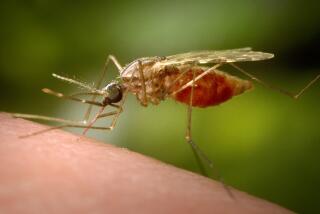Week of AZT Helps Cut AIDS Transmission
- Share via
Researchers trying to reduce the cost of preventing AIDS among the world’s poor have found that giving mothers standard medicines for just a week cut the risk that they will pass on the virus during childbirth by more than one-third.
Doctors have known for about five years that the drug AZT during pregnancy blocks HIV-infected mothers from giving the virus to their babies. However, such information is of little use in places such as Africa and India, where most mother-to-child transmission of AIDS occurs.
In wealthy countries, infected mothers typically receive five months of AZT, a treatment that can cost more than $1,000. Such therapy is impossible in places where even aspirin is unaffordable and prenatal care is unheard of.
Doctors reported Monday that a far less intensive kind of treatment works reasonably well, although not as effectively as the standard U.S. approach.
“Even if we start treating very late in pregnancy, we can make a difference,” said one of the researchers, Dr. Joseph Saba of the United Nations AIDS program. He presented the results at the sixth Conference on Retroviruses and Opportunistic Infections.
If this or a similar approach is tried, it could have a major impact on the spread of AIDS during childbirth, which now accounts for nearly 600,000 HIV infections worldwide each year.
AIDS researchers got a setback Monday, however, when a study confirmed what many had feared--the so-called live vaccine does not work in monkeys.
Tests on macaques show that a live but genetically crippled version of the virus somehow manages to reconstitute itself in the body, giving the animals AIDS.
“Our study indicates that it is not safe to conduct human tests of AIDS vaccines made from live, weakened viruses,” Dr. Ruth Ruprecht of Boston’s Dana-Farber Cancer Institute said in a statement. “There is a real risk of contracting AIDS from the vaccine itself.”
Ruprecht has warned before that monkeys can develop AIDS from the vaccine. Reporting in the February issue of Nature Medicine, she now says that all eight newborn monkeys given the vaccine have some form of immune system disease, and six have full-blown AIDS.
This is a blow to doctors and activists who had hoped the live vaccine could go into human tests. The Chicago-based International Assn. of Physicians in AIDS Care has collected more than 50 physician volunteers, but they have been blocked from trying the vaccine on themselves by a wary National Institutes of Health.
Live vaccines are often used--against polio, for instance--and are usually safe.






